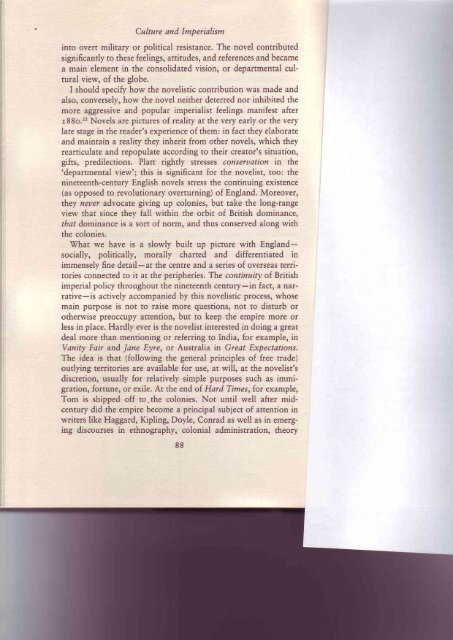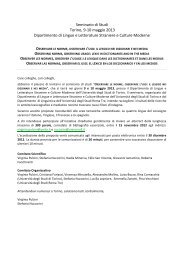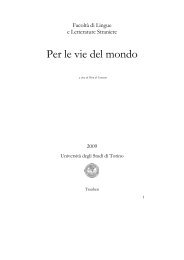Consolidated Vision
Consolidated Vision
Consolidated Vision
You also want an ePaper? Increase the reach of your titles
YUMPU automatically turns print PDFs into web optimized ePapers that Google loves.
Culture and Imperialism<br />
into overt military or political resistance. The novel contributed<br />
significantly to these feelings, attitudes, and references and became<br />
a main element in the consolidated vision, or departmental cultural<br />
view, of the globe.<br />
I should specify how the novelistic contribution was made and<br />
also, conversely, how the novel neither deterred nor inhibited the<br />
more aggressive and popular imperialist feelings manifest after<br />
r88o.22 Novels are pictures of reality at the very early or the very<br />
late stage in the reader's experience of them: in fact they elaborate<br />
and maintain a reality they inherit from other novels, which they<br />
rearticulate and repopulate according to their creator's situation,<br />
gifts, predilections. Platt rightly stresses conseruation in the<br />
'departmental<br />
view'; this is significant for the novelist, too: the<br />
nineteenth-century English novels stress the continuing existence<br />
(as opposed to revolutionary overturning) of England. Moreover,<br />
they neuer advocate giving up colonies, but take the long-range<br />
view that since they fall within the orbit of British dominance,<br />
that dominance is a sort of norm, and thus conserved along with<br />
the colonies.<br />
What we have is a slowly built up picture with Englandsocially,<br />
politically, morally charted and differentiated in<br />
immensely fine detail-at the centre and a series of overseas territories<br />
connected to it at the peripheries. The continuity of British<br />
imperial policy throughout the nineteenth century-in fact, a nar<br />
rative-is actively accompanied by this novelistic process, whose<br />
main purpose is not to raise more questions, not to disturb or<br />
otherwise preoccupy attenticn, but to keep the empire more or<br />
less in place. Hardly ever is the novelist interested in doing a great<br />
deal more than mentioning or referring to India, for example, in<br />
Vanity Fair and lane Eyre, or Australia in Great Expectations.<br />
The idea is that (following the general principles of free trade)<br />
outlying territories are available for use, at will, at the novelist's<br />
discretion, usually for relatively simple purposes such as immigration,<br />
fortune, or exile. At the end of Hard Times, for example,<br />
Tom is shipped off to.the colonies. Not until well after midcentury<br />
did the empire become a principal subject of attention in<br />
writers like Haggard, Kipling, Doyle, Conrad as well as in emerging<br />
discourses in ethnography, colonial administration, theory<br />
88<br />
rq





